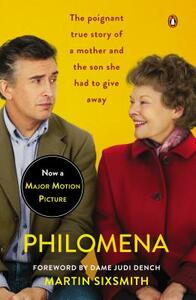You need to sign in or sign up before continuing.
Take a photo of a barcode or cover
216 reviews for:
Philomena (Movie Tie-In): A Mother, Her Son, and a Fifty-Year Search
Martin Sixsmith
216 reviews for:
Philomena (Movie Tie-In): A Mother, Her Son, and a Fifty-Year Search
Martin Sixsmith
I'm a person who, I watch MAYBE 5 or 6 movies a YEAR. I hate the boring process of sitting down, maybe with some family or friends, and just staring at the TV screen for a couple hours when I could be doing WAY more productive things. Philomena was one of the first movies I'd watched in a LONG time, and I absolutely ADORED it. I thought it was the cutest, yet most horrible, thing I'd ever seen. I found myself telling my friends all about the movie, and sending out excited texts about having found the book at my neighborhood book swap.
I was very pleasantly surprised with it. I must say, I probably liked the movie just a hair better because it left out the, frankly, boring parts of the book - such as the chapters that focused on the political side of the Ireland-baby-selling thing.
I loved the parts about Philomena and Anthony though. Especially the beginning, when telling the story of when Philomena was still at the abbey and Anthony was a little boy, I thought it was just such a charming tale.
I'd recommend anyone who has a family member whose truly dear to them should read this.
I was very pleasantly surprised with it. I must say, I probably liked the movie just a hair better because it left out the, frankly, boring parts of the book - such as the chapters that focused on the political side of the Ireland-baby-selling thing.
I loved the parts about Philomena and Anthony though. Especially the beginning, when telling the story of when Philomena was still at the abbey and Anthony was a little boy, I thought it was just such a charming tale.
I'd recommend anyone who has a family member whose truly dear to them should read this.
A really moving and touching book. It's just sad to see how the son and mother never meet until the son dies. In many ways this book is more about the life of the son than the mother trying to find the son, but in spite of this, it's really a sad story. Difficult to not cry after reading this book.
This book was disappointing - it was mainly about the baby's life while the movie was mainly about the mother's search for the son. A combination of the two would have been so much better. This book may not appeal to those who object to alternative life-styles.
This book is really about the son, not the mother. But still a fascinating tale.
I watched the movie before I knew there was a book.
I'm glad I did. The movie truly is about Philomena. The book is far more about the little boy she gave up for adoption, Anthony/Michael.
Together they tell a whole story.
I'm glad I did. The movie truly is about Philomena. The book is far more about the little boy she gave up for adoption, Anthony/Michael.
Together they tell a whole story.
emotional
informative
sad
medium-paced
I have very mixed feelings about this book. I decided to read it because I enjoyed the movie "Philomena" very much but realized that some things in the movie had been fictionalized. I thought that reading the book would tel me everything I wanted to know about Philomena. Unfortunately the answer to that is no, it did not.
Here are a couple of things about the book:
1. The story of Philomena Lee takes up only about a quarter of the book--the first section tells the story of how she gave birth to Anthony at the convent and stayed there three years working in the laundry and caring for her child until he is adopted. The last 20 pages pick the story up fifty years later when Philomena finally finds the truth about what happened to her child. That is all we get about her. There was no trip to America with Martin Sixsmith to search for her child. There was no angry confrontation with an old nun. We learn next to nothing about the years in between for Philomena during which she married, twice, and had children and grandchildren.
2. The story of the life of Anthony Lee, who was renamed Michael Hess by his adopted family, is way, way too long. Mr. Sixsmith hints at his sources--photographs, diaries, and interviews. There are no comprehensive notes to tell us his sources. This is frustrating because the story is told in such an intimate way that the reader must question the source and decide that much is speculation. The style is more like a novel than a piece of journalism.
3. Way too much space is given to the agony of growing up as an adoptee. Perhaps Mike was always ultra-sensitive, and perhaps his family was just obtuse. His adoptive father, Doc Hess, is the "villain" of the book. Doc is depicted as selfish and cruel. It is implied that he did not support adopting the children, although it is said that he had wanted a daughter and that is why Marge Hess sought to adopt from Ireland. Very little insight is given to Marge and Doc and the impact of adding two small, foreign children to a family that already had three older boys. And the frequent use of the word "orphan" rather than "adoptee" is irritating. In the strict sense of the word, Mike was not an orphan. Although we should understand Mike's sense of abandonment and his desire to please people, the heavy emphasis on the psychological angle for everything that happens is just too much.
4. Once Mike is in college, the long exploration of his homosexuality is overdone. This could have been covered with far less purple prose. There is no way to know Mike's thoughts and emotional state as he explored Chicago and Washington D.C.'s gay bars and culture. This is written more like a novel than a piece of non-fiction.
5. The years of Mike's career as a lawyer and Republican National Committee employee could deserve a book of their own. Sixsmith, a political person, is very interested in this part of the story. How a sensitive, liberal-leaning gay man came to be one of the top people in the GOP is a twisted tale of following a course of pleasing others and denying your inner self. And a truly disturbing twist, Mike Hess is largely responsible for the GOP's choice to pursue gerrymandering at all political levels to thwart the voting power of minorities and the Democrats. His work led to the rise of Newt Gingrich's majority in Congress in the 90's, and by extension, to the ultra-divisive politics of today. In my books, being a nice guy privately doesn't make up for the terrible harm he did to the electoral system.
6. In small, niggling ways, Sixsmith, a Brit, does not quite understand life in America in the 50's and 60's. I am almost exactly the same age as Michael Hess--we were born withing months of each other and I too grew up Catholic in the middle of the country. The nuances of high school life just do not ring true. Also, for a young man who was in law school in DC during the Watergate years, who is interested in constitutional law, the total absence of the impact of Watergate is the dog that didn't bark.
7. We do get glimpses of how Mike began the search for Philomena and came to be buried in the convent cemetery after his death from AIDS. But these scenes are deeply buried and rather short.
I do not recommend this book for casual readers who enjoyed the movie. You will not feel satisfied. I found the book to be a real slog in the middle and I almost gave up.
Here are a couple of things about the book:
1. The story of Philomena Lee takes up only about a quarter of the book--the first section tells the story of how she gave birth to Anthony at the convent and stayed there three years working in the laundry and caring for her child until he is adopted. The last 20 pages pick the story up fifty years later when Philomena finally finds the truth about what happened to her child. That is all we get about her. There was no trip to America with Martin Sixsmith to search for her child. There was no angry confrontation with an old nun. We learn next to nothing about the years in between for Philomena during which she married, twice, and had children and grandchildren.
2. The story of the life of Anthony Lee, who was renamed Michael Hess by his adopted family, is way, way too long. Mr. Sixsmith hints at his sources--photographs, diaries, and interviews. There are no comprehensive notes to tell us his sources. This is frustrating because the story is told in such an intimate way that the reader must question the source and decide that much is speculation. The style is more like a novel than a piece of journalism.
3. Way too much space is given to the agony of growing up as an adoptee. Perhaps Mike was always ultra-sensitive, and perhaps his family was just obtuse. His adoptive father, Doc Hess, is the "villain" of the book. Doc is depicted as selfish and cruel. It is implied that he did not support adopting the children, although it is said that he had wanted a daughter and that is why Marge Hess sought to adopt from Ireland. Very little insight is given to Marge and Doc and the impact of adding two small, foreign children to a family that already had three older boys. And the frequent use of the word "orphan" rather than "adoptee" is irritating. In the strict sense of the word, Mike was not an orphan. Although we should understand Mike's sense of abandonment and his desire to please people, the heavy emphasis on the psychological angle for everything that happens is just too much.
4. Once Mike is in college, the long exploration of his homosexuality is overdone. This could have been covered with far less purple prose. There is no way to know Mike's thoughts and emotional state as he explored Chicago and Washington D.C.'s gay bars and culture. This is written more like a novel than a piece of non-fiction.
5. The years of Mike's career as a lawyer and Republican National Committee employee could deserve a book of their own. Sixsmith, a political person, is very interested in this part of the story. How a sensitive, liberal-leaning gay man came to be one of the top people in the GOP is a twisted tale of following a course of pleasing others and denying your inner self. And a truly disturbing twist, Mike Hess is largely responsible for the GOP's choice to pursue gerrymandering at all political levels to thwart the voting power of minorities and the Democrats. His work led to the rise of Newt Gingrich's majority in Congress in the 90's, and by extension, to the ultra-divisive politics of today. In my books, being a nice guy privately doesn't make up for the terrible harm he did to the electoral system.
6. In small, niggling ways, Sixsmith, a Brit, does not quite understand life in America in the 50's and 60's. I am almost exactly the same age as Michael Hess--we were born withing months of each other and I too grew up Catholic in the middle of the country. The nuances of high school life just do not ring true. Also, for a young man who was in law school in DC during the Watergate years, who is interested in constitutional law, the total absence of the impact of Watergate is the dog that didn't bark.
7. We do get glimpses of how Mike began the search for Philomena and came to be buried in the convent cemetery after his death from AIDS. But these scenes are deeply buried and rather short.
I do not recommend this book for casual readers who enjoyed the movie. You will not feel satisfied. I found the book to be a real slog in the middle and I almost gave up.



